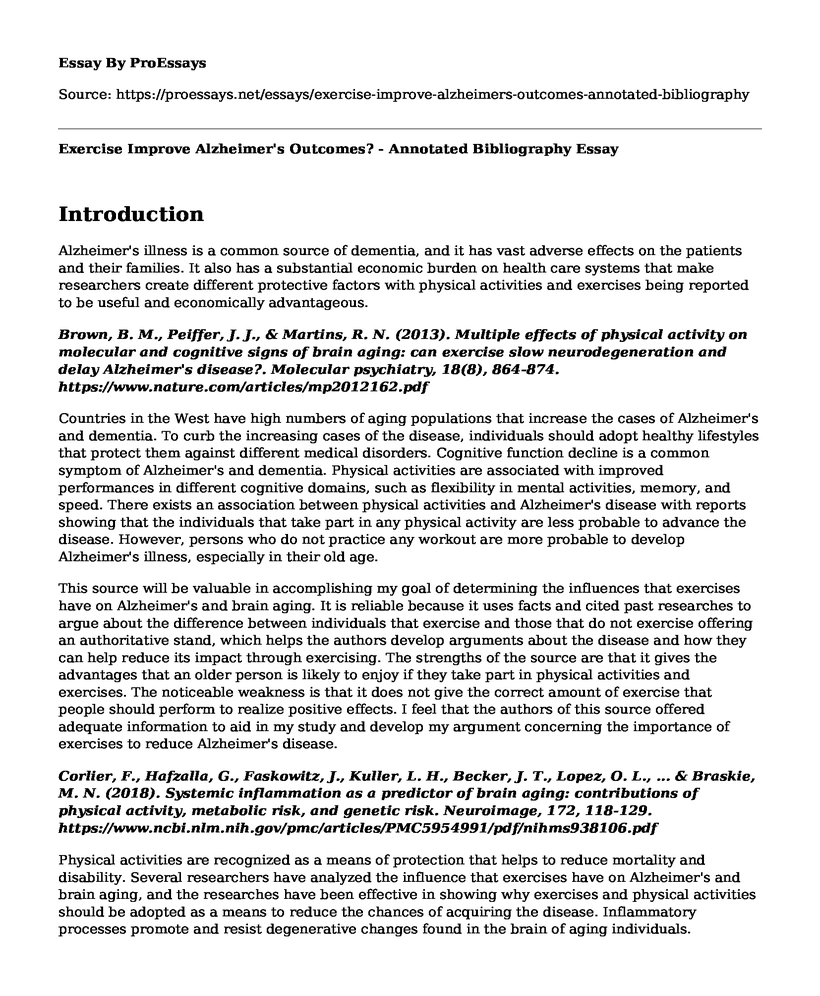Introduction
Alzheimer's illness is a common source of dementia, and it has vast adverse effects on the patients and their families. It also has a substantial economic burden on health care systems that make researchers create different protective factors with physical activities and exercises being reported to be useful and economically advantageous.
Brown, B. M., Peiffer, J. J., & Martins, R. N. (2013). Multiple effects of physical activity on molecular and cognitive signs of brain aging: can exercise slow neurodegeneration and delay Alzheimer's disease?. Molecular psychiatry, 18(8), 864-874. https://www.nature.com/articles/mp2012162.pdf
Countries in the West have high numbers of aging populations that increase the cases of Alzheimer's and dementia. To curb the increasing cases of the disease, individuals should adopt healthy lifestyles that protect them against different medical disorders. Cognitive function decline is a common symptom of Alzheimer's and dementia. Physical activities are associated with improved performances in different cognitive domains, such as flexibility in mental activities, memory, and speed. There exists an association between physical activities and Alzheimer's disease with reports showing that the individuals that take part in any physical activity are less probable to advance the disease. However, persons who do not practice any workout are more probable to develop Alzheimer's illness, especially in their old age.
This source will be valuable in accomplishing my goal of determining the influences that exercises have on Alzheimer's and brain aging. It is reliable because it uses facts and cited past researches to argue about the difference between individuals that exercise and those that do not exercise offering an authoritative stand, which helps the authors develop arguments about the disease and how they can help reduce its impact through exercising. The strengths of the source are that it gives the advantages that an older person is likely to enjoy if they take part in physical activities and exercises. The noticeable weakness is that it does not give the correct amount of exercise that people should perform to realize positive effects. I feel that the authors of this source offered adequate information to aid in my study and develop my argument concerning the importance of exercises to reduce Alzheimer's disease.
Corlier, F., Hafzalla, G., Faskowitz, J., Kuller, L. H., Becker, J. T., Lopez, O. L., ... & Braskie, M. N. (2018). Systemic inflammation as a predictor of brain aging: contributions of physical activity, metabolic risk, and genetic risk. Neuroimage, 172, 118-129. https://www.ncbi.nlm.nih.gov/pmc/articles/PMC5954991/pdf/nihms938106.pdf
Physical activities are recognized as a means of protection that helps to reduce mortality and disability. Several researchers have analyzed the influence that exercises have on Alzheimer's and brain aging, and the researches have been effective in showing why exercises and physical activities should be adopted as a means to reduce the chances of acquiring the disease. Inflammatory processes promote and resist degenerative changes found in the brain of aging individuals. Alzheimer's disease affects older adults and leads to cognitive declines as well as structural changes such as metabolic risks that include obesity, dyslipidemia, the resistance of the insulin, and high blood pressure. These factors place elderly individuals at the risk of getting dementia or chronic inflammation.
However, when they are introduced to different physical activities, they experience lower peripheral inflammation and cognition protection. The authors of this source explain the benefits of exercises to include weight loss that helps to decrease the likelihoods of getting Alzheimer's illness and dementia, inducing trophic factors that contribute to the protection of the brain and modulates inflammatory processes.
This source is reliable, and it will be useful in my goal of researching the advantages of exercises in the reduction of brain aging and Alzheimer's disease. The authors are authoritative in this topic as they use the article to explain how inflammation leads to brain aging and the way that exercises and physical activities help to improve brain health in older adults. The source is informative, and it helps to increase my knowledge about brain aging and Alzheimer's illness and how their effects can be reduced using exercises.
References
Brown, B. M., Peiffer, J. J., & Martins, R. N. (2013). Multiple effects of physical activity on molecular and cognitive signs of brain aging: can exercise slow neurodegeneration and delay Alzheimer's disease?. Molecular psychiatry, 18(8), 864-874. https://www.nature.com/articles/mp2012162.pdf
Corlier, F., Hafzalla, G., Faskowitz, J., Kuller, L. H., Becker, J. T., Lopez, O. L., ... & Braskie, M. N. (2018). Systemic inflammation as a predictor of brain aging: contributions of physical activity, metabolic risk, and genetic risk. Neuroimage, 172, 118-129. https://www.ncbi.nlm.nih.gov/pmc/articles/PMC5954991/pdf/nihms938106.pdf
Cite this page
Exercise Improve Alzheimer's Outcomes? - Annotated Bibliography. (2023, May 04). Retrieved from https://proessays.net/essays/exercise-improve-alzheimers-outcomes-annotated-bibliography
If you are the original author of this essay and no longer wish to have it published on the ProEssays website, please click below to request its removal:
- Effects of Social Media on Physical and Mental Health Essay
- Essay Sample on The Functional Movement Screen in Medicine
- Essay Sample on Evidence-Based Medicine
- Nurses: The Patient's Greatest Advocates in Healthcare Delivery - Research Paper
- Woodland Heights Medical Center: Low Vaccination Rates Among Health Care Workers - Essay Sample
- 150 Years of St. Elizabeth Healthcare: A History of Providing Quality Care - Report Sample
- Case Study Sample on 43-Year-Old Male Suffering From Pain & RSD: Case Study







